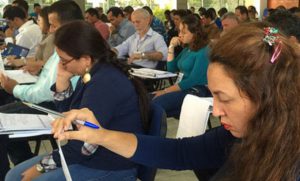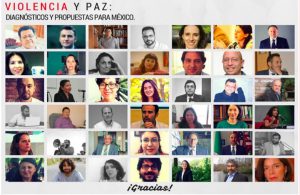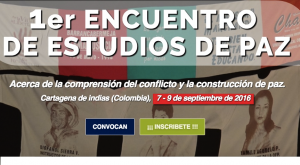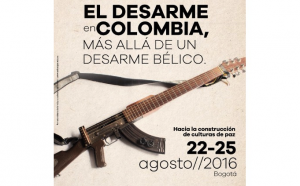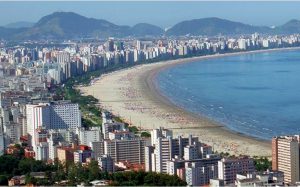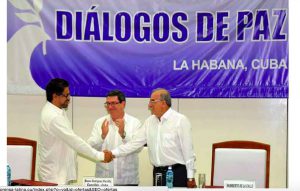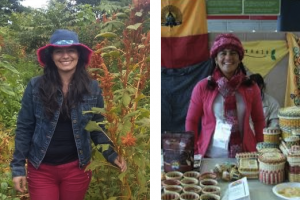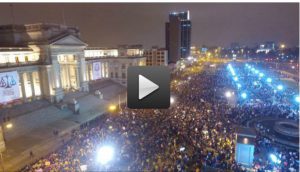FREE FLOW OF INFORMATION
An article by the Abya Yala Agricultural Collective in CONPI.org (translated by CPNN)
“We believe that the defense of life and territory cannot be an isolated task of our indigenous communities, and thus we propose bonds of unity, solidarity, fraternity and commitment with whom we share the land as small farmers: the communities of African descent and others, not only those in the agricultural and rural sectors but also those in cities who also want to change the history of this country,” – National Dialogue Declaration of Indigenous Women for Peace
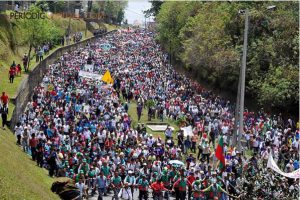
As noted by the historian Diana Uribe, we have come to a turning point in Colombia with the negotiated solution to the armed conflict between the Revolutionary Armed Forces of Colombia – People’s Army and the National Government. We are also encouraged by the announcement last March of negotiations with the ELN National Liberation Army to advance the construction of a diverse nation that is no longer marked by the history of war.
This article aims to make visible the voice of the indigenous, peasant and Afro-descendant ommunities. Its victims have been deeply affected by the unresolved armed conflict in the country, but nevertheless they are moving forward with proposals from their territories in the post-accord context, as stated in the following excerpt from the report of the Historical Commission of the conflict:
“The main players of today [in relation to the assertion of rights] are now urban dwellers, displaced by war, peasants and indigenous sectors, women, inmates of prisons, and ethnic and sexual minorities. Their demands include the desire for peace,
– the rejection of anti-democratic amendments to the Constitution and legislation,
– the denunciation of the tax reforms,
– the unveiling of the negative effects of NAFTA,
– land claims,
– opposition to programs that would eradicate illicit crops with aerial spraying with effects on environmental and living conditions,
– reform of the public hospital sector,
– changes in the educational system,
– the placement of demobilized and displaced persons,
– an end to actions that violate human rights by the armed forces “(page 67)
As a sign of support for the process of negotiation of Havana, the communities have presented their positions on complex issues such as the arrival of former combatants into their territories.
In Caldono last July the traditional authorities of the indigenous reserves of Pueblo Nuevo, San Lorenzo de Caldono, Pioyá from the Municipality of Caldono and Tumburao from the Municipality of Silvia published a letter offering their territories to install a ZVTN. (District Zone for Transition to Normalization):
“When we heard the news that Caldono is a ZVTN, it was no surprise because we have prepared for it, not so much for the large investments that we may receive as part of the implementation of the agreements, but rather to welcome our colleagues who with or without conviction joined the insurgency that brought so much disharmony and imbalance to different territories of the country. They will be welcomed, forgiven and asked to compensate for the damages with ideas that positively transform the social order. This will clarity the values of our community set out in our Law of Origins by returning to our community its members, both men and women, returning them to their spiritual home and harmonizing the relation between the community and Mother Earth.”
(Article continued in the right column)
(Click here for the original version of this article in Spanish or here for a translation into French.
What is happening in Colombia, Is peace possible?
(Article continued from the left column)
For their part, the rural communities of the Peasant Reserve Areas that are expected to be protagonists in the postconflict agreements have offered themselves as managers of the implementation process of the agreements through a critical look at laws like the ZIDRES [Zones of Rural, Economic, and Social Interest] which they consider to be in conflict with the process.
According to the Political Declaration of the General Assembly of the National Association of Peasant Reserve Zones (ANZORC): “As the 66 processes of the Peasant Reserve Zones ANZORC, at a general meeting in the village of San Isidro de Pradera (Valle), we see a great opportunity in the eventual signing of a final agreement with the FARC and the implementation of peace agreements. (…) ANZORC, in its first General Assembly of 2016, decided
– to initiate a process of territorial anchoring of the peace accords,
– to advance the special circumscriptions of the peace accords (i.e. the 16 zones of transition),
– to promote intercultural territories,
– to fight against the expropriation of 6,000 peasant families living in the alleged “vacant FARC” regions of El Pato Balsillas, El Yari, the Losada-Guayabero and La Macarena,
– to oppose the law of ZIDRES,
– to establish rural guards in their territories,
– to establish a dialogue with the Ministry of the Environment and Autonomous Regional Corporations concerning the law on the 2nd forest reserve zone and regional protected areas,
– to formulate a proposal for social control over the extent of coca crops,
– to extend the process of popular assemblies throughout the country,
– and to strengthen our involvement in the National Constituent Assembly.”
In Natagaima from 12 to 14 August this year under the theme “Indigenous Women weaving their thoughts to defend the territory and build peace with social justice” more than 170 indigenous women from different villages, after a festive march in the municipality publicly declared their “Yes” to the plebiscite with the understanding that peace becomes possible with the end of the armed conflict, but it will not be easy:
“We believe that indigenous peoples must not be indifferent to the historical moment facing the country with the end of the armed conflict. The process in which we have been involved includes an ethnic approach to each component of the agreements. We must prepare to ratify our YES in the referendum as the main tool to build territories for peace with social justice. This means balance and harmony in our relationship with Mother Nature and the guarantee of conditions for a dignified life in our territories and our communities. ”
It has been declared by the parties at the negotiation table in Havana that the implementation of the agreements requires a new approach in order to overcome the historical and structural conditions of the armed conflict in Colombia. In this approach it is necessary to include the proposals of communities from the territories. This approach must see beyond the rigid legal principles of the Anglo-Saxon tradition in the constitution and the law, and take into consideration the diverse cosmologies of the peoples. It must fight against practices such as racism and extinction of indigenous communities.
The Interethnic Dialogue Peace Proposal brought to the table in Havana last April 6 by indigenous organizations and Afro-Colombianos reads as follows: “The black communities of African descent, the palenqueras, raizales and indigenous peoples conceive the territory as a collective good, in the function of the needs of its inhabitants. The land is a source of material, cultural and ecological life. It is not a commercial product based on private profit. The land has to be seen as a geographical and free space where communities can fully develop, as the physical place and symbolic source of sovereign welfare and independence, under the principles of autonomy, solidarity, growth, indigenous development, balance and sustainability ” (…)
“Indigenous peoples, Blacks, Afro-Colombians, palenqueros and raizales have been historic victims of exclusionary structures of racist and discriminatory State practices that have prevented us from enjoying all the rights and guarantees that citizens should have in a nation . In that regard, the social and armed conflict that the country has experienced for 60 years has particularly affected these communities in all aspects.”
Finally, we say that the challenge of building a culture of peace in Colombia will take several generations but at each step forward, there is more hope in our territories that we can finally emerge from the long night of 500 years, the colonial and republican legacy of war.
